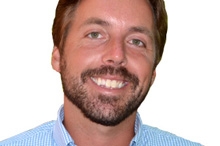
 Justin Auciello is being honored as a Champion of Change for the leadership he demonstrated in his involvement in response and recovery efforts following Hurricane Sandy.
Justin Auciello is being honored as a Champion of Change for the leadership he demonstrated in his involvement in response and recovery efforts following Hurricane Sandy.
It is a tremendous honor to be recognized as a White House Champion of Change. Altruism is a trait that is deeply ingrained in my personality, and I firmly believe that I was born to serve my community and inspire others to do the same.
Since childhood, I have always been fascinated by news. I have vivid memories of hearing the fire siren sound in my town, hopping on my bike, and chasing down the fire trucks. I would find out what was happening and return home to tell my parents. I always wanted to "be in the know." Along with news, other passions have always included community service and understanding how communities function. It is thus no surprise that I pursued city planning and journalism as a career, as both are interconnected and allow me to inform and assist communities -- both physically and virtually. Naturally, with the advent of social media in the beginning of the 21st century, the nature of news began to change.
When I first got involved with social media in 2003, I saw unlimited potential in interaction, news gathering, and community building, as ordinary people now had the ability to gather and report news. I call it "the democratization of media." Creating Jersey Shore Hurricane News (JSHN) on August 23, 2011 was a natural extension of my years of citizen journalism. In my own barrier island community of South Seaside Park NJ, panic over Hurricane Irene's potentially destructive impacts was beginning to simmer, and I knew that people were feeling this same anxiety throughout New Jersey. I felt a calling to create a "pop-up" news outlet on Facebook in an effort to supply reliable, real-time news as well as serving as a platform for collaborative bottom-up reporting from ordinary citizen contributors. Social media carries so much value during breaking news situations, especially since many people are without power and rely on their smartphones. Its value also resides in its ability to deliver news almost instantly. I saw this as a prime opportunity to democratize media in New Jersey: empower citizens and give them the tools to be on-the-ground journalists.
My vision was to provide a ground swell of accurate information from both personal reporting and newsgathering from all angles -- potential weather impacts, evacuation orders, shelter information, etc. I also wanted JSHN to be a place where people could ask questions and provide ground-truth reports from their locations, a technique known as "crowdsourcing." But understanding the dangers of reporting erroneous information, I knew that I had to be especially careful with tips, by vetting and confirmation information through a variety of journalistic mechanisms.
New Jersey was largely spared from catastrophic impacts from Hurricane Irene. However, with information supplied before, during, and after the storm, JSHN's value was proven. After Irene, JSHN evolved into a real-time news, traffic, and weather platform, with the citizen contributor continuing to be the major source of information.
During Superstorm Sandy, JSHN relayed critical information and squashed rumors in real-time with information gleaned from emergency management officials and a variety of sources, which was then shared by contributors and spread virally throughout the social media world. Since the "contributor culture" was already firmly embedded within the JSHN ethos before Sandy, the citizen reporters were armed with the ability to report what was happening around them during Sandy, supplying valuable news reports that were subsequently vetted through a variety of means before publishing. In addition, people used to service to find water, ice, generators, supplies, etc and in some cases, request rescue from flood waters (the New Jersey Office of Emergency Management was monitoring and dispatched crews to many locations). In the days and weeks after landfall, JSHN became a major humanitarian hub, providing an organized outlet for the dissemination of a variety of recovery news and information -- once again mainly provided by the ordinary citizen. People were even finding photos and other items that had been washed away by the storm surge and posting on JSHN, with many reunited with their possessions through simply power in numbers. Many were inspired and gained hope when JSHN published positive news in the days and weeks after the storm. Today, recovery reporting continues, along with general news. JSHN continues to be a trusted outlet where people continually collaborate and contribute information.
I am proud of how New Jersey residents reported and organized itself during a time of tremendous stress before, during, and after Superstorm Sandy. If used properly, social media can be an incredibly powerful tool that can help countless people remain informed and safe. I remain committed to serving my state by employing innovative news practices and inspiring others to do the same. After all, I am just an ordinary citizen, as is everyone who supplies information. With just a bit of experience and knowledge, you can also serve your community by leveraging the power of social media.
Justin Auciello, 33, is the founder of Jersey Shore Hurricane News, a bottom-up, two-way social media-based news outlet that provides New Jersey residents with news, traffic, and weather reports and serves as a community forum. Auciello holds a bachelor's degree in Government and Politics from the University of Maryland-College Park and a master's degree in City and Regional Planning from Rutgers University's Edward J. Bloustein School of Planning and Public Policy.


